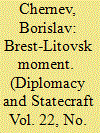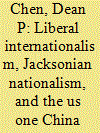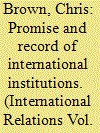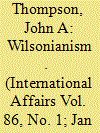|
|
|
Sort Order |
|
|
|
Items / Page
|
|
|
|
|
|
|
| Srl | Item |
| 1 |
ID:
107059


|
|
|
|
|
| Publication |
2011.
|
| Summary/Abstract |
The article argues that the historical origins of the concept of self-determination had less to do with Woodrow Wilson than with the specific circumstances during the last phase of the Great War. It argues that self-determination became the "centre of the discourse of legitimacy in international relations" as a result of a dynamic process involving multiple actors. Lenin and the Bolsheviks first started to employ the concept. Self-determination discourse gained further momentum during the Brest-Litovsk peace conference, where the Austro-German and Russian delegations debated its application at some length. This prompted Allied statesmen to crystallise their ideas and make self-determination their principal war aim. The increasing appeal of self-determination first manifested itself in the entangled spaces of Eastern Europe, where the national aspirations of Poles and Ukrainians, bolstered by the new discourse, converged with the rhetoric emanating from Brest-Litovsk to create a "Wilsonian moment" before Wilson.
|
|
|
|
|
|
|
|
|
|
|
|
|
|
|
|
| 2 |
ID:
155208


|
|
|
|
|
| Summary/Abstract |
This article examines how Wilsonian foreign policy tradition has shaped the postwar US One China policy, and how Jacksonianism, championed by the Donald Trump administration, challenges that vision. Embracing militant nationalism, commercial mercantilism, and unilateralist diplomacy, Trump’s commitment to “One China” will more likely be conditional on Sino–American transactional interchanges.
|
|
|
|
|
|
|
|
|
|
|
|
|
|
|
|
| 3 |
ID:
167184


|
|
|
|
|
| Summary/Abstract |
In 1919 the attempt was made to reset the institutions governing international relations, with new patterns of expected behaviour and new international organisations. The key organisation, the League of Nations, effectively remains in place, albeit rebranded as the United Nations, but in 2019 great power relations have reverted to pre-1914 modes of conduct; attempts to extend the range of international institutions after the end of the Cold War have failed at the level of the central system. Outside of this central system, an extensive human rights regime, new notions of sovereignty and the development of international criminal law have produced a new set of institutions and expectations, an embryonic ‘global polity’ based on post-1945 European political experience and extending to democracies in Latin America and Africa. The rise of populism is placing strains on this global polity and the relations between this mode of doing international relations and that of the three major powers is also a source of tension – the fate of the liberal internationalist ideas set in train in 1919 remains in the balance.
|
|
|
|
|
|
|
|
|
|
|
|
|
|
|
|
| 4 |
ID:
137373


|
|
|
|
|
| Summary/Abstract |
This analysis draws lessons about the failure of Wilsonian Pan–Americanism from an examination of the American occupation of Chiriquí, Panama, an event long neglected by historians. It argues that the Woodrow Wilson Administration missed an opportunity to demonstrate to Panamanians, and Latin Americans more generally, the benefits to be gained by accepting its tutelage and leadership in inter-American affairs. Rather than collaborate with a sympathetic Liberal regime in Panama City, Washington embarked on a unilateral mission to re-make a part of Panama in its image. The result was a surge of nationalist resistance that threatened the overthrow of the government in Panama City and hastened the end of the occupation. Chiriquí is representative of American efforts in the region before the 1930s and helps to explain Wilson’s failure to build a “new world order” in the Western Hemisphere.
|
|
|
|
|
|
|
|
|
|
|
|
|
|
|
|
| 5 |
ID:
095110


|
|
|
|
|
| Publication |
2010.
|
| Summary/Abstract |
Americans have generally seen the principles and objectives proclaimed by President Woodrow Wilson during the First World War as having continued relevance for United States foreign policy. However, they have often differed over their application to specific situations, particularly because there is likely to be a tension between a drive to establish democratic values across the globe and commitment to a universal system of collective security. Rather than seeking a pure, abstract definition of 'Wilsonianism', it is more illuminating to examine its origins and evolution in relation to the development of American foreign policy over the years. Tracing this historical process reveals that Wilson committed himself to a postwar league of nations during the period of American neutrality, but it was only as the United States became a belligerent that the spread of democratic government became a policy objective, and then only in a partial and qualified way. A similar pattern has been discernible in subsequent decades. It has been during conflicts, or the run-up to them, that the more ideological and revisionist aspects of Wilsonian principles have come to the fore, whereas it has been in the aftermath of conflicts that there has been the greatest interest in the potentialities of a universal collective security organization. There has also been a broad shift of emphasis over time. As confidence in America's power position has grown, the core of Wilson's legacy has more often come to be seen as the promotion of democracy rather than the strengthening of international institutions. The persistence of both themes may be seen as reflecting basic and enduring elements of the policy-making context-on the one hand, the interests of the United States as a status quo power, and on the other, the demands of domestic American opinion.
|
|
|
|
|
|
|
|
|
|
|
|
|
|
|
|
|
|
|
|
|